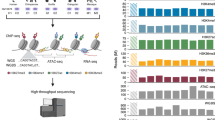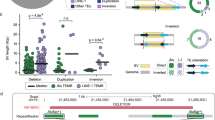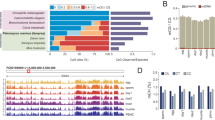Abstract
The absence of global methylation changes in eutherian interspecific hybrids compared with their parents, observed by Roemer et al., sharply contrasts with our own studies of interspecific hybrids between various species of kangaroo. We observed hybrid-specific undermethylation, retroelement activation and genome remodelling1, and suggested that these events occurring together may bring about rapid karyotypic change.
Similar content being viewed by others
O'Neill et al. reply
We agree with Roemer et al. that marsupials and eutherians are likely to have diverged from one another in their reliance on and use of the epigenetic information conveyed by DNA methylation. Although these events may be specific to marsupial or even macropod interspecific hybrids, there is evidence that eutherian genomes may be subject to at least some degree of the same sort of hybrid dysgenic perturbations. Interspecific hybrids of the genus Peromyscus (deer mice) do not show whole-genome changes in methylation, as determined by digestion with MspI and HpaII (R.J.W.O'N. et al., unpublished observations), yet they exhibit disruptions in imprinted gene expression associated with allele-specific undermethylation2. The mechanism underlying the loss of imprinting in these hybrids remains unknown, but there is a subtle change in methylation in this eutherian hybrid cross2. Digestion of genomic DNA with MspI and HpaII may be too blunt an instrument to reveal subtle changes (less than 20%) in methylation.
Our main finding is a link between DNA methylation, retroelement activity and genome rearrangement. The dramatic perturbations of methylation and genome structure that we observed in kangaroo hybrids may be an extreme example of dysgenic changes that occur on a broader scale in many organisms.
References
O'Neill, R. J. W., O'Neill, M. J. & Graves, J. A. M. Nature 393, 68– 72 (1998).
Vrana, P. B. et al. Nature Genet. 20, 362– 365 (1998).
Author information
Authors and Affiliations
Corresponding author
Rights and permissions
About this article
Cite this article
O'Neill, R., O'Neill, M. & Graves, J. reply: Global methylation in eutherian hybrids . Nature 401, 132 (1999). https://doi.org/10.1038/43611
Issue Date:
DOI: https://doi.org/10.1038/43611
Comments
By submitting a comment you agree to abide by our Terms and Community Guidelines. If you find something abusive or that does not comply with our terms or guidelines please flag it as inappropriate.



